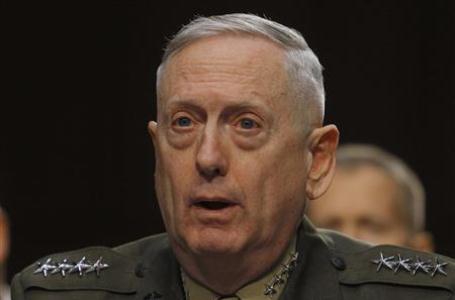 (Reuters) - A top U.S. general said on Tuesday that American efforts aimed at preventing Iran from obtaining a nuclear weapon were not working, even as he voiced support for crippling sanctions and diplomatic efforts aimed at isolating the Islamic state.
(Reuters) - A top U.S. general said on Tuesday that American efforts aimed at preventing Iran from obtaining a nuclear weapon were not working, even as he voiced support for crippling sanctions and diplomatic efforts aimed at isolating the Islamic state."I still support the direction we're taking. I'm just paid to take a rather dim view of the Iranians, frankly," General James Mattis, the head of the U.S. military's Central Command, told a Senate hearing.
Mattis also painted a daunting portrayal of events on the ground in Syria, where he said the situation was too complex at this point for him to support arming rebels battling Syrian President Bashar al-Assad's regime.
"We don't want to inadvertently, with the best of intentions, arm people who are basically sworn enemies," he said before the Senate Armed Services Committee.
More than 70,000 Syrians have been killed in a fierce conflict that began with peaceful anti-Assad protests nearly two years ago. Some 860,000 have fled abroad and several million are displaced within the country or need humanitarian assistance.
Iran supports Assad and Mattis predicted that a fall of the Assad regime would represent a major setback for Tehran, prompting an Iranian backlash that would see it arming militias in Syria to "try to create a Lebanese-Hezbollah-type effect."
"The collapse of the Assad regime, sir, would be biggest strategic setback for Iran in 25 years," Mattis said in response to a question from Senator Jack Reed of Rhode Island.
Asked by Reed whether the United States would plan for that scenario explicitly, Mattis responded: "And we are, Senator."
Mattis said "quiet planning" was also underway with regional allies for potential stability operations if needed after the Syrian regime's collapse, and pointed to regional organizations like the Arab League and the Gulf Cooperation Council (GCC) as groups "that may be able to take this on."
"We are doing some planning with the regional militaries and getting basically a framework for what this would look like," he said.
Still, Mattis said the situation in Syria remained "fundamentally unpredictable," even though Assad's power base and geographic area of control were eroding.
Asked how long he believed Assad could hold onto power, at least in a sub-region of Syria, Mattis said: "I really don't have the ability to forecast this well, Senator."
"I'd hate to give you some kind of certainty that I don't sense right now," he said.
TIME RUNNING OUT FOR IRAN
Israel, Iran's arch-enemy and convinced Tehran is secretly trying to develop nuclear weapons, has grown impatient with the protracted talks and has threatened pre-emptive war against Tehran if it deems diplomacy ultimately futile.
Mattis at one point was asked point blank whether he thought diplomatic efforts and sanctions were working to stop Iran from obtaining a nuclear weapon.
"No sir," he said.
Later, when pressed, Mattis said he fully supported economic sanctions and diplomatic isolation.
"I believe they are trying to buy time with the negotiations but that should not be in any way construed as 'We should not try to negotiate,'" Mattis said, noting President Barack Obama's warning that military intervention was an option if all else were to fail.
At the Pentagon, Defense Secretary Chuck Hagel said during talks with his Israeli counterpart that Washington was committed to preventing Iran from obtaining a nuclear weapon.
"He stated that the United States continues to believe there is still time to address this issue through diplomacy, but that window is closing," Pentagon spokesman George Little said.
U.S. Secretary of State John Kerry said in an interview with ABC World News that persistent Iranian stalling raises the risks and that "confrontation becomes more possible."
Mattis spent much of the hearing discussing budget cuts in the United States that prompted a decision to reduce the U.S. aircraft carrier presence in and around the Gulf from two to one carriers. Mattis said the cuts, known in Washington jargon as "sequester," would hurt the military but warned potential adversaries that he could respond if needed to any scenario.
"I would just caution any enemy that might like as an opportunity to take advantage of this situation, that that would be very ill advised," Mattis said.
"If the president orders into action, I have what it takes to make it the enemy's longest day and their worst day. And we'll get the other carrier out there quickly to reinforce."
By Reuters
The Iran Project is not responsible for the content of quoted articles.











